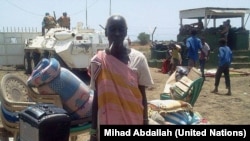The United States continues to support regional and international efforts to bring the warring parties in South Sudan back to the bargaining table and end the fighting in the troubled East African nation.
In a meeting April 10 in Washington with South Sudanese minister Awan Riak, Secretary of State John Kerry expressed our nation’s grave concern about the conflict and resulting humanitarian crisis that forced hundreds of thousands of people there to flee their homes. He also called on all South Sudanese leaders to prioritize the interests of the South Sudanese people over their own.
Fighting erupted in mid-December, triggered by an apparent power struggle between the government of President Salva Kiir and rebels led by former Vice President Reik Macher.
The roots of this crisis run deep, reaching well back before fighting erupted. Many historical grievances remained after creation of the new nation in 2011. On top of that, the government progressively reduced the ability for political activists, media and civil society to voice their concerns.
When the Intergovernmental Authority on Development-sponsored negotiations resume, the political settlement must be more than a quick fix. Accommodating the two parties and their immediate needs will not bring a sustainable peace. A spectrum of South Sudanese stakeholders must be brought into the process and allowed to take part in national affairs. Reconciliation must also follow, as well as accountability for the serious human rights abuses that have occurred.
The suffering has gone on too long. The world is waiting for all parties in the conflict to finally implement the Cessation of Hostilities Agreement they signed on January 23. The fighting must end now.
In a meeting April 10 in Washington with South Sudanese minister Awan Riak, Secretary of State John Kerry expressed our nation’s grave concern about the conflict and resulting humanitarian crisis that forced hundreds of thousands of people there to flee their homes. He also called on all South Sudanese leaders to prioritize the interests of the South Sudanese people over their own.
Fighting erupted in mid-December, triggered by an apparent power struggle between the government of President Salva Kiir and rebels led by former Vice President Reik Macher.
The roots of this crisis run deep, reaching well back before fighting erupted. Many historical grievances remained after creation of the new nation in 2011. On top of that, the government progressively reduced the ability for political activists, media and civil society to voice their concerns.
When the Intergovernmental Authority on Development-sponsored negotiations resume, the political settlement must be more than a quick fix. Accommodating the two parties and their immediate needs will not bring a sustainable peace. A spectrum of South Sudanese stakeholders must be brought into the process and allowed to take part in national affairs. Reconciliation must also follow, as well as accountability for the serious human rights abuses that have occurred.
The suffering has gone on too long. The world is waiting for all parties in the conflict to finally implement the Cessation of Hostilities Agreement they signed on January 23. The fighting must end now.






